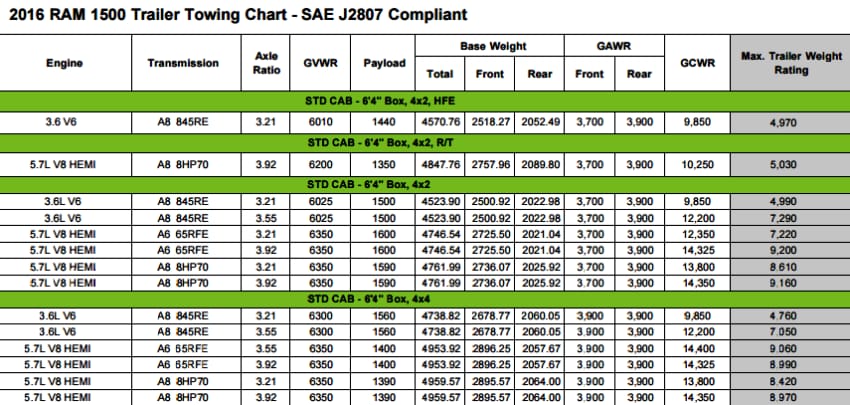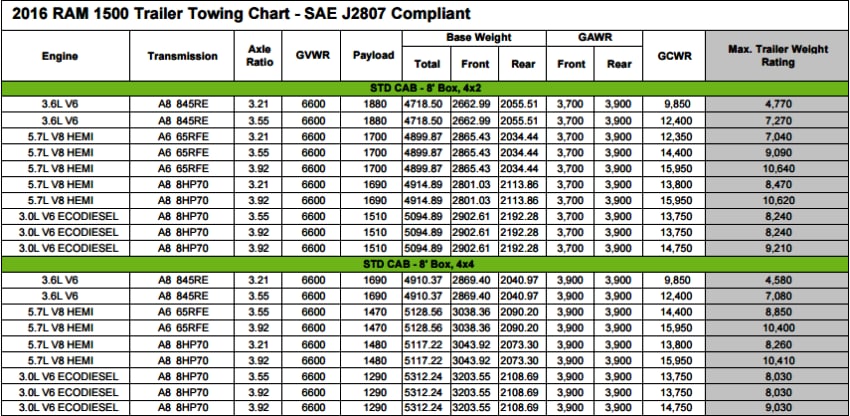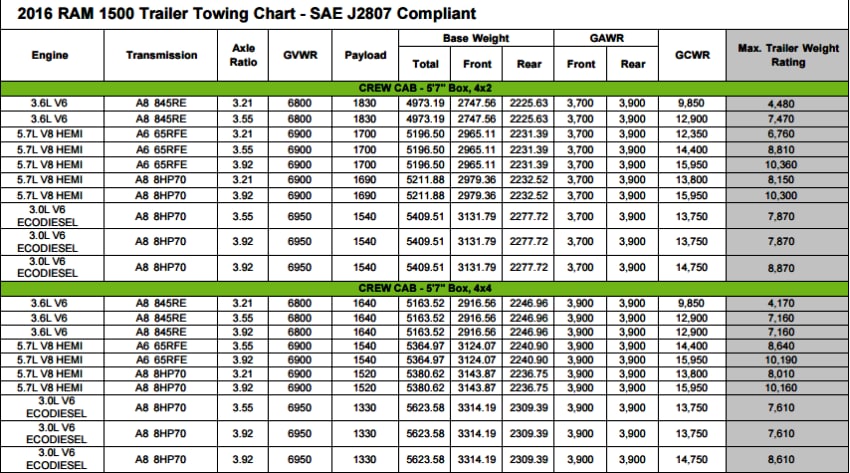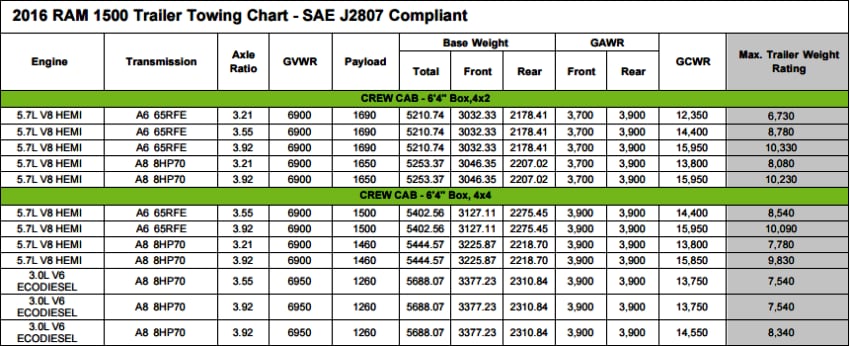





1. Payload and Max Trailer Weights are ESTIMATED values.
2. All weights are shown in pounds unless otherwise stated.
3. Payload and Max Trailer Weight values are rounded to the nearest 10 lb.
4. Payload = GVWR – Base Weight.
5. Trailer Weight Rating and Tow Vehicle Trailering Weight are calculated as specified in SAE J2807. Passenger Weight = 300 lb. Options Weight is option content above 33 percent of sales volume. Trailer equipment weight = Class IV receiver hitch is 11.1 lb (if not already included in options weight). Trailer Hitch is 10 lb if TWR is less or equal to 5,000 lb and 65 lb if TWR is greater than 5,000 lb.
6. Payload and Trailer Weight Rating are mutually exclusive.
7. GAWRs, GVWRs and GCWRs should never be exceeded.
8. The recommended tongue weight for a conventional hitch is 10 percent of the gross trailer weight. The maximum tongue weight for Class IV receiver hitch is limited to 1100 lb.
9. Weight Distributing Hitch is recommended for trailers over 5,000 lb.
10. Quad Cab and Crew Cab models with Off Road Tire (s/c TXN), All Terrain Tire (s/c TWG) or Steel Wheel (s/c WFP) have 6800 lb GVWR.
11. All models with 22 inch Tires (s/c TY4) have 6200 lb GVWR.
12. Big Horn and Lone Star packages equipped with the 3.0L V6 EcoDiesel Engine and a 3.92 axle ratio have 13,750 lb. GCWR.
Towing Basics
Gross Combined Vehicle Weight (GCVW) is the total combined weight of a fully loaded vehicle, including passengers, payload and everything in tow.
Gross Vehicle Weight(GVW) is the total weight of a fully loaded vehicle, including passengers and payload – but excluding all towing.
Gross Trailer Weight (GTW) is the total weight of the trailer plus all the cargo in it.
Curb Weight - The weight of a vehicle without any passengers or cargo, but including all necessary fuel, fluids and standard equipment.
Axle Ratio - The ratio between the revolutions per minute of the driveshaft and the rear axle. In general, a higher number offers more towing power; a lower number offers better engine efficiency.
Trailer Tongue Weight - The downward force exerted on the hitch ball by the trailer coupler. In most cases, it should fall between 10 to 25 percent of GTW. Trailer tongue weight must be accounted for in total payload.
Common Weights *Weights provided are estimates only. Always check manufacture labels for actual weight. Properly secure all cargo.
Trailers
Boat trailer: 300 – 1,512 pounds
6 x 4 box trailer: 430 pounds
7 x 5 box trailer: 507 pounds
Car trailer: 2,800 pounds
Equipment trailer: 1,600 pounds (aluminum, 6'8" x 24'6")
Horse trailer: 2,400 pounds (unloaded)
Kayak trailer: 220 pounds
Boats
Canoe / kayak: 50 pounds
Motorboat: 2,500 pounds
Sailboat: 7,000 pounds
Cars
Racecar: 1,600 – 3,500 pounds
Sedan: 3,000 pounds
Station wagon: 3,600 pounds
Pickup truck: 5,500 pounds
RV’s
Fifth-wheel trailers: 19,000 pounds (3,126 pounds trailer tongue weight)
Travel trailer: 5,000 – 12,000 pounds
Camping trailer: 3,000 pounds
Truck camper: 3,500 pounds (unloaded)
Construction Equipment
Backhoe: 14,000 - 19,000 pounds
Bulldozer: 16,000 - 19,000 pounds
Case 580N Loader / Backhoe: 14,500 - 17,500 pounds
Case Crawler Dozer: 16,250 - 44,269 pounds
Case Skid Steer Loader: 5,000 - 8,300 pounds
Cement mixer (6 cubic feet): 670 pounds
Cement mixer (1 cubic yard): 7,000 pounds
Generator (3100 watt): 181 pounds
Building Materials
Plywood: 3 pounds / square foot per inch of thickness
Gravel: 3,400 pounds / yard
Cement mix: 80 pounds / bag
Mulch: 500 pounds / yard
Sand: 2,600 pounds / yard
Pavers: 3,170 pounds / pallet (624 pavers)
Agriculture
New Holland T7000 Series Tractor: 16,000 pounds
New Holland Bale Wagons: 5,500 - 16,000 pounds
New Holland Pull-Type Forage Harvester: 500 pounds
Upfits
Rollback: 1,500 pounds
Stake bed: 1,500 pounds
Cherry picker: 2,000 – 5,000 pounds
